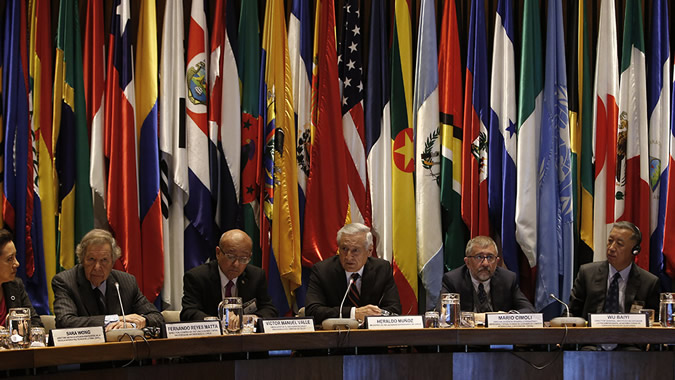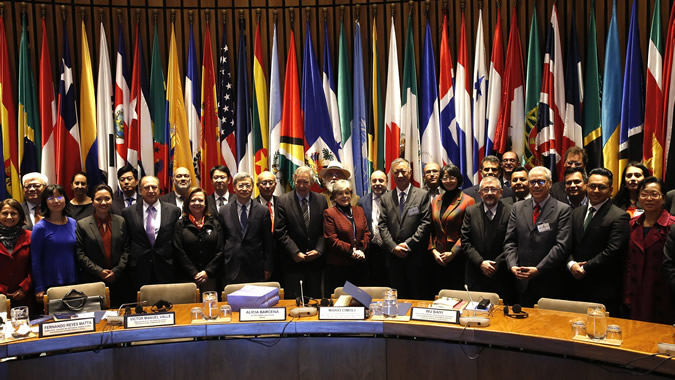Opportunities for Cooperation between China and Latin America and the Caribbean Are Underscored in Academic Forum at ECLAC
Work area(s)
The First CELAC-China High-level Academic Forum was inaugurated at the organization’s headquarters in Santiago and attended by Chilean Foreign Minister Heraldo Muñoz.

Authorities and experts inaugurated the First CELAC-China High-level Academic Forum this Tuesday, October 17, at the headquarters of the Economic Commission for Latin America and the Caribbean (ECLAC) in Santiago, Chile, recognizing the enormous opportunities for economic, social, political and cultural cooperation between the Asian giant and the Latin American and Caribbean region, particularly in the current international context marked by uncertainty, the effects of climate change and the revival of protectionist trends.
The event, which runs through Wednesday, October 18, was organized by the Institute of Latin American Studies (ILAS)-Chinese Academy of Social Sciences, the Institute of Chile (the seat of Chilean academies), ECLAC and the Chilean Ministry of Foreign Affairs. It brings together distinguished international specialists and professors to share their experiences and debate the challenges of cooperation between China and Latin America.
The meeting was kicked off by Chile’s Minister of Foreign Affairs, Heraldo Muñoz, who underscored the significance of holding a gathering of this nature in our region for the first time, just months before the Second Meeting of Foreign Ministers from CELAC and China scheduled for next January in Santiago. “It will be, without a doubt, a historic milestone in that it will allow us to deepen ties between both sides even further. The opportunities for cooperation across diverse areas are huge,” he emphasized.
The Chilean Foreign Minister underlined the positive increase in trade between his country and the region in general with China in recent years, but stressed the importance of adding value to the Latin American exports shipped to the Asian nation, as well as of attracting Chinese investment to the region, especially in areas requiring greater technology and knowledge. “Moreover, after the UN’s approval in 2015 of the 2030 Agenda for Sustainable Development, China and Latin America have a platform for the next 14 years to advance toward fulfillment of its goals and thus achieve a more egalitarian and environmentally sustainable development,” he said.
El Salvador’s Ambassador to Chile, Víctor Valle Monterrosa, addressed attendees in his country’s capacity as President Pro Tempore of the Community of Latin American and Caribbean States (CELAC). He underscored ECLAC’s contribution to the development of regional thinking over the past 70 years, as well as its relationship with China, which has allowed the region to find valid paths to development, keeping the well-being of humanity at the forefront.
“China and Latin America and the Caribbean have broad cultural roots and much to contribute to the planet. An alliance between the two can influence world peace, development and the well-being of all peoples,” stated the Ambassador.
The Director General of the Institute of Latin American Studies of the Chinese Academy of Social Sciences (ILAS-CASS), Wu Baiyi, pointed out that, while China and Latin America and the Caribbean may be geographically distant, encounters such as this forum – which have proliferated in recent years – help to strengthen ties between both sides. “As Chinese President Xi Jinping put it, friendship can bridge distances,” he said.
Wu Baiyi stated that cooperation between China and Latin America and the Caribbean is of the utmost importance, especially in a world as globalized as today’s. “Economic globalization on the one hand promotes development and improvements in productivity, but it also has negative aspects. To overcome those difficulties, Chinese-Latin American cooperation can generate constructive thinking and thus unlock the full extent of our development potential,” he stressed.
On behalf of ECLAC’s Executive Secretary, Alicia Bárcena, Mario Cimoli – Director of the organization’s Production, Productivity and Management Division and Officer-in-Charge of the International Trade and Integration Division – welcomed attendees. The senior UN official indicated that there is no better time than the present, marked by economic and political uncertainties and dire environmental effects worldwide, to open a debate between China and Latin America and the Caribbean, considering that both sides must understand what lies ahead in order to best prevent the potential effects, prioritizing the security, growth and harmony of their citizens.
“Multilateralism must be our focus; it is a model to emulate and the only way for all countries to engage in dialogue, just as China and its President have pointed out,” remarked Cimoli. “There are many joint issues we need to address: trade and the renegotiation of major agreements; technologies; productive specialization; middle classes, among others. Along with CELAC, we are in a privileged position to be able to discuss these issues with China,” he underlined.
Participants in the First CELAC-China High-level Academic Forum will debate over the next two days on different panels addressing the economic reforms in China and their implications for Latin America and the Caribbean, especially ahead of the 19th National Congress of the Communist Party of China, which will begin on October 19 in Beijing. They will also analyze issues such as trade, financial relations and investment between both parties, as well as infrastructure and connectivity, the One Belt One Road initiative, and projections for China and the region in science, technology and innovation, among others.
The event is expected to produce a document with recommendations for increasing cooperation between China and Latin America and the Caribbean, which will serve as the key input for the next meeting of the CELAC-China foreign ministers to be held in January 2018 in Chile.
Related content

China and Latin America and the Caribbean Must Advance Together Toward the Digital Revolution, the Green Economy, Job Creation and the Fight against Inequality: ECLAC
The organization’s Executive Secretary, Alicia Bárcena, spoke at the conclusion of the debates of the First CELAC-China High-level Academic Forum, which was held in Santiago, Chile.
Type
Country(ies)
-
China
- Latin America and the Caribbean
Related link(s)
Contact
Public Information Unit
- prensa@cepal.org
- (56 2) 2210 2040
